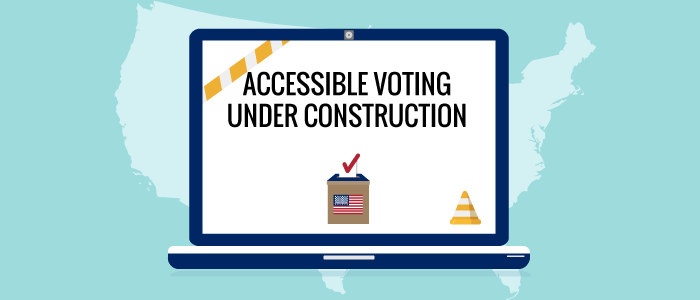Audit Showed States’ Mail-in Ballot Applications Were Not Digitally Accessible, Influencing the Election’s Outcome
HERNDON, VA – November 24, 2020 – While some state websites have made progress since 2016’s vote, the 2020 election showed that digital accessibility has a long way to go. Many eligible voters with disabilities were impeded from casting a ballot in the recent Presidential election because the application forms required to vote-by-mail were digitally inaccessible. So much so, that the final election result could have been easily swayed by accessibility.
Deque Systems’ September audit of the required mail-in ballot application forms (PDFs) for registered voters discovered that 43 states’ applications had some level of digital inaccessibility – making them challenging or impossible to complete by certain people with disabilities. Deque alerted each state to this digital divide, providing fully accessible forms at no charge.
Progress Made: 16 states made significant progress in enabling people with disabilities to vote safely via mail-in ballots. These states enabled a more accessible vote-by-mail process by implementing accessible web and PDF applications, or by eliminating the application process entirely.
Progress Still To Come: Voters with disabilities in the remaining 34 states could not use their assistive technologies, like screen readers, to read and complete those applications. This group comprises a number of potential eligible voters greater than the number of voters which determined the winner in this Presidential election.
The Americans with Disabilities Act (ADA) and Section 504 of the Rehabilitation Act require that government agencies guarantee certain rights to people with disabilities. Recent 4th and 6th Circuit federal court rulings have confirmed that accessibility applies to election websites, apps, online documents, forms or applications, as well as the absentee ballots themselves.
“Digital accessibility is the modern-day expression of the Americans with Disabilities Act (ADA). The fact that 34 states were unresponsive to Deque’s offer indicates they are not getting the message,” comments Eve Hill, an attorney at Brown, Goldstein and Levy. “Digital accessibility is as essential as offering physical accommodations, like ramps or braille signs, for in-person voting locations. Such complacency leaves these government agencies vulnerable to lawsuits.”
Common accessibility issues included missing alt-text and missing or improper semantic markup for things like headings, forms and lists, all of which make these documents difficult to read, for example, by a visually impaired person relying on a screen reader.
“Given the necessity of mail-in ballots this election, it was frustrating that more states did not respond to help people with disabilities exercise their constitutional right,” says Preety Kumar, CEO of Deque Systems. “We estimate that many thousands of Americans were impeded from one of the most contested elections in history. This is an issue that must be avoided in future elections, as we increasingly rely on digital means to conduct life’s activities.”
Deque Systems plans to offer similar services to states in future elections.
Rhode Island Goes the Extra Mile: Rhode Island worked with Deque to remediate both their English and Spanish application forms, as well as emergency request applications. “Our mission is to improve access to the ballot box while securing the integrity of every vote,” says Rob Rock, Director of Elections, Rhode Island Department of State. “I am excited to implement these more accessible digital applications for the voters of Rhode Island.”
What is Digital Accessibility? Digital Accessibility is the practice of making digital documents, web and mobile apps accessible to everyone, including people with disabilities. Many people with visual, auditory, motor, speech or cognitive disabilities rely on various forms of assistive technology or usability features to experience the full benefit the web has to offer. Without the continuous use of features like captions, alt-text for screen readers, zoom functions, simple presentation layouts and more, digital content may be inconvenient or impossible to use.
*The 6th Circuit case on voting is Hindel v. Husted, 875 F.3d 344.
**The 4th Circuit Case is National Federation of the Blind v. Lamone, 813 F.3d 494.
About Deque Systems
Deque (pronounced dee-cue) is a web accessibility software and services company, and our mission is Digital Equality. We believe everyone, regardless of their ability, should have equal access to the information, services, applications, and everything else on the web.
We work with enterprise-level businesses and organizations to ensure that their sites and mobile apps are accessible. Installed in over 250,000 browsers and with over 1,000 audit projects completed, Deque is the industry standard.
News Media Contacts
At Deque:
Ryan Bateman, 703-225-0380, marketing@deque.com


